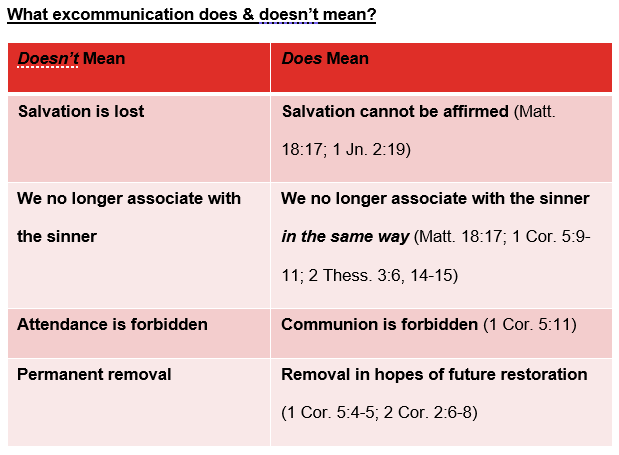Excommunication 101


Although excommunication is not a word used in Scripture, it has a rich history in the Christian church, including among historical Baptists. Although it has fallen on hard times in recent decades, the concept of excommunication as the final step of church discipline is clearly taught in Scripture. But what do we mean at PBC when we use the term?
What is excommunication?
Excommunication is the act by which the Church removes unrepentant sinners from Membership, barring them from the Lord’s Supper until they repent and are restored to the Church. This does not mean excommunicated persons are mistreated or shunned, but that Members “treat them as unbelievers” (Matthew 18:17), lovingly pleading with them to repent and be restored.

Why not simply remove sinning members from the membership list without excommunication? Isn’t this a bit drastic?
Because simple removal does not warn the sinner (or the rest of the members) in the same way (2 Thess. 3:14-15). Our failure to do this may withhold from the sinner the grace by which God will bring him/her to repentance and restoration (1 Cor. 5:4-5; 2 Cor. 2:6-8).
What sins warrant excommunication?
Excommunication should ordinarily only be contemplated in cases of significant, outward, unrepentant sin after individual private admonition has failed.[i]
What counts as a “significant” sin?
Jonathan Leeman puts it this way: “It’s sin that makes it difficult to continue believing someone bears the Spirit of God and is a Christian, at least if he or she refuses to repent. Remember what membership is: a church’s affirmation of a person’s profession of faith. Significant sin is sin that makes it difficult, if not impossible, to stand before the watching world and continue to affirm a profession of faith as credible. I can, with a clear conscience, continue to affirm the faith of someone who denies he exaggerated a story; I cannot, with a clear conscience, do so for someone who persists in sexual immorality, verbal abuse, drunkenness, and so forth.”
[i] From PBC Constitution, Article 7.5.2
[i] From PBC Constitution, Article 7.5.2
.png)